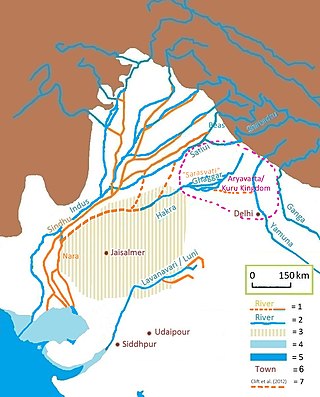Saraswati , or Sarasvati, is a Hindu goddess.
Contents
Saraswati or Sarasvati may also refer to:
Saraswati , or Sarasvati, is a Hindu goddess.
Saraswati or Sarasvati may also refer to:

The Sarasvati River is a mythologized and deified ancient river first mentioned in the Rigveda and later in Vedic and post-Vedic texts. It played an important role in the Vedic religion, appearing in all but the fourth book of the Rigveda.

Saraswati, also spelled as Sarasvati, is one of the principal goddesses in Hinduism, revered as the goddess of knowledge, education, learning, arts, speech, poetry, music, purification, language and culture. She is one of the prominent goddesses in the Vedic tradition who retains her significance in later Hinduism. Together with the goddesses Lakshmi and Parvati, she forms the trinity, known as the Tridevi. Sarasvati is a pan-Indian deity, venerated not only in Hinduism but also in Jainism and Buddhism.
Bhat is a surname in the Indian subcontinent. Bhat and Bhatt are shortened renditions of Brahmabhatta or Bhatta.
Deva may refer to:
Saraswat Brahmins are spread over widely separated regions spanning from Kashmir and Punjab in North India to Konkan in West India to Kanara and Kerala in South India. In places such as western and southern India, the claim of Brahminhood of some communities who claim to be Saraswat Brahmins is disputed. The word Saraswat is derived from the Rigvedic Sarasvati River.
Kamat or Kamath is a surname from Goa, Maharashtra and coastal Karnataka in India. It is found among Hindus of the Goud Saraswat Brahmin, Saraswat and Rajapur Saraswat Brahmin communities following Madhva Sampradaya of either Gokarna Matha or Kashi Matha.
Chitrapur Saraswats are a small Konkani-speaking community of Hindu Brahmins in India. They are traditionally found along the Kanara coast and call themselves Bhanaps in the Konkani language.
Mukherjee, also Mukerjee, Mookerjea, Mookerjee, Mukerji, Mukherji, Mukhujje or Mookherjee, is a Bengali Hindu Kulin Brahmin surname originating from the Bengal region of the Indian subcontinent. The traditional Bengali version is Mukhopaddhae, which is sometimes written Mukhopadhyay.
The Saraswata kingdom was an ancient kingdom, territory, or region on the banks of the Sarasvati River during the pre-historic ages. This region is mentioned in detail in as many as 20 chapters in the Mahabharata from (9:35) to (9:54). Balarama traced the Saraswati river through its partially dried up course from the ocean near Prabhasa to its origin in the Himalayas.
Gaud Saraswat Brahmins (GSB), also known as Shenvis are a Hindu community of contested caste status and identity. They primarily speak Konkani and its various dialects as their mother tongue.
Ojha is a Hindu surname. The term Ojha' or Oza is a Hindu Brahmin caste that has settled in north and central India and are found in the states of Rajasthan, Uttar Pradesh and some parts of Bihar and Madhya Pradesh. Ojha is a surname for Hindu Sikhwal Brahmins, Shrimali Brahmins, Atri Gotra Brahmin, Saraswat Brahmin, Bhumihar Brahmins, Kanya Kubj Brahmin, Saryuparin Brahmin, Maithil Brahmin of Nepal, Nepali, Vishwakarma Brahmin, and Bengali Brahmin of India and Nepal. Ojhas are considered to be worshipers of Durga, Saraswati, Hanuman, Mahalakshmi and Shiva. The surname is used amongst speakers of Nepali, Bhojpuri, Rajasthani, Gujarati, Hindi, Oriya, Maithili, Kumaoni and Bengali as well as the Santhals. In India all ojha originate from Rajasthan.Ojha were also spiritual leader for uttar Pradesh and Bihar region. They perform as “Rajguru”, “Army Trainer”, “Thinker” and Philosopher. Most of the Ojhas are concentrated in the Rajasthan Gujarat (India) and Nepal.
Prabhu means master or prince in Sanskrit and many of the Indian languages; it is a name sometimes applied to God.
Wagle is a surname that occurs in multiple cultures.
Konkani cuisine is the cuisine of the Saraswat Brahmins from the Konkan region on the western coast of India. Konkani cuisine differs within the Saraswat Brahmin subsects and within the Konkan-Canara region. Konkani cuisine originally hails from the Konkan region including Uttara Kannada, Udupi district, Dakshina Kannada, Damaon, and Goa, India. Konkani cuisine is popular served in many restaurants throughout the western coast of India, and especially in the cities of Bombay and Bangalore. Each variation has its unique flavour and makes uses of different vegetables and fruits available in the region. Konkani cuisine is usually pesco-vegetarian, except acharyas and purohits who follow a strictly saatvik vegetarian diet. According the Konkani folklore, fish, meats are regarded as sea vegetables. Historically, they have refrained from eating any terrestrial animals in general.
Mangaloreans are a collection of diverse ethnic groups that hail from the historical locales of South Canara (Tulunaad) on the south western coast of Karnataka, India, particularly the residents native to Mangaluru.

Saraswati Devi, born Khorshed Minocher-Homji, was an Indian director of music and score composer who worked in Hindi cinema in the 1930s and 1940s. She is most noted for her score, Mein Ban ki Chiriyra Banke Bun Bun Bolun Re in Bombay Talkies's Achut Kanya (1936). She along with Nargis' mother & Sanjay Dutt's grandmother Jaddanbai is considered to be one of the first female music composers in Indian cinema.
Shri Katyayani Baneshwar Temple ,(Sanskrit:श्री क़ात्यायनी बाणेश्व् र मन्दिर), or the Aversa Hindu Narayani is a Hindu temple in the coastal town of Aversa near Ankola, in the Uttara Kannada district of Karnataka. It is around 100 km (62 mi) from Goa, India, 500 km (310 mi) from Bangalore and 136 km from Hubli.

Madhva Brahmins, are Hindu Brahmin communities in India, who follow Sadh Vaishnavism and Dvaita philosophy propounded by Madhvacharya. They are found mostly in the Indian states of Karnataka, Maharashtra, Goa, Tamil Nadu, Kerala, Telangana and Andhra Pradesh.
The Indori river, is a rain-fed river originates from Aravalli Range from Sikar district and flows through Alwar district of Rajasthan to Rewari district of Haryana and it is the longest tributary of Sahibi River which stretches to 50 km. In Delhi, it is called the Najafgarh drain or Najafgarh Nallah.